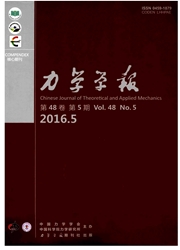

 中文摘要:
中文摘要:
金属蜂窝板结构在高温热环境下的隔热特性是高速飞行器热防护设计的重要参数.使用自行研制的高速飞行器瞬态气动热试验模拟系统,对高温合金蜂窝平板结构在高达800℃的非线性热环境下的隔热性能进行实验研究,获得了蜂窝板结构的瞬态和稳态传热特性以及在多种不同温度下金蜂窝平板结构隔热效果的实验数据.在考虑结构内部蜂窝芯壁面问辐射、金属结构的传热以及蜂窝腔内空气传热的多重热交换条件下,采用二维有限元计算方法对蜂窝板的隔热特性进行了数值模拟,计算结果和试验结果的吻合性良好,验证了数值模拟方法的可信性和有效性,并为数值模拟方法能够在一定程度上较好地替代价格昂贵的气动热模拟试验打下了基础.讨论了在复杂非线性高温环境下金属蜂窝板隔热效率的变化,加热面温度的升降速度与隔热效率的关联性以及金属蜂窝板表面发射率的选取等问题,对高速飞行器金属蜂窝结构的热防护研究具有重要的参考价值.
 英文摘要:
英文摘要:
The heat-shielding characteristics of metallic honeycomb panel structure (MTPS) in high temper- ature environments are very important parameters for thermal protection design of high-speed aircrafts. Using the self-developed transient aerodynamic heating simulation system designed for high-speed aircrafts, the heat- shielding performance of MTPS in the non-linear high temperature environment up to 800℃ was experimentally investigated. The heat-transfer characteristics of MTPS at transient and steady states, and the heat insulation effects at various temperatures, were obtained. Also, by carefully considering the multiple heat exchange including the radiation among the inside honeycomb walls, the heat transfer of the metal structure and the heat transfer of the air within the honeycomb cavity, a three dimensional finite element model was established to simulate the heat-shielding performance of the honeycomb panels. The numerical simulations agree well with the experimental results, verifying the correctness and effectiveness of the numerical simulation method. The good agreements also confirm the feasibility of substituting expensive air thermal simulation testing using numerical simulation. Some other key issues, such as heat shielding efficiency variation of the MTPS in complex non-linear high temperature environment, the relutionship among the heat shielding efficiency, the change speed of front surface temperature and selection of emissivity for the MTPS' surface, were also discussed in this work, which provide important references for the heat-shielding of MTPS to be used in high-speed crafts.
 同期刊论文项目
同期刊论文项目
 同项目期刊论文
同项目期刊论文
 High-temperature digital image correlation method for full-field deformation measurement at 1200 deg
High-temperature digital image correlation method for full-field deformation measurement at 1200 deg Internal displacement and strain measurement using digital volume correlation: a least-squares frame
Internal displacement and strain measurement using digital volume correlation: a least-squares frame Optimization of a three-dimensional digital image correlation system for deformation measurements in
Optimization of a three-dimensional digital image correlation system for deformation measurements in Incremental calculation for large deformation measurement using reliability-guided digital image cor
Incremental calculation for large deformation measurement using reliability-guided digital image cor High-Accuracy 2D Digital Image Correlation Measurements with Bilateral Telecentric Lenses: Error Ana
High-Accuracy 2D Digital Image Correlation Measurements with Bilateral Telecentric Lenses: Error Ana An active imaging digital image correlation method for deformation measurement insensitive to ambien
An active imaging digital image correlation method for deformation measurement insensitive to ambien High-accuracy two-dimensional digital image correlation measurement system using a bilateral telecen
High-accuracy two-dimensional digital image correlation measurement system using a bilateral telecen Strain measurement of objects subjected to aerodynamic heating using digital image correlation: Expe
Strain measurement of objects subjected to aerodynamic heating using digital image correlation: Expe High-speed and accurate non-linear calibration of temperature sensors for transient aerodynamic heat
High-speed and accurate non-linear calibration of temperature sensors for transient aerodynamic heat Experimental study and numerical simulation of active vibration control of a highly flexible beam us
Experimental study and numerical simulation of active vibration control of a highly flexible beam us Experimental and numerical study on heat transfer characteristics of metallic honeycomb core structu
Experimental and numerical study on heat transfer characteristics of metallic honeycomb core structu Experimentalresearch on thermal insulation performance of lightweight ceramic material inoxidation e
Experimentalresearch on thermal insulation performance of lightweight ceramic material inoxidation e Thermalprotection performance of metallic honeycomb core panel structures innon-steady thermal envir
Thermalprotection performance of metallic honeycomb core panel structures innon-steady thermal envir Optimizationof a three-dimensional digital image correlation system for deformationmeasurement in ex
Optimizationof a three-dimensional digital image correlation system for deformationmeasurement in ex High-temperature strain measurement using active imaging digital image correlation and infrared radi
High-temperature strain measurement using active imaging digital image correlation and infrared radi Insulation Performance of Heat-Resistant Material for High-Speed Aircraft Under Thermal Environments
Insulation Performance of Heat-Resistant Material for High-Speed Aircraft Under Thermal Environments Accurate ex situ deformation measurement using an ultra-stable two-dimensional digital image correla
Accurate ex situ deformation measurement using an ultra-stable two-dimensional digital image correla 期刊信息
期刊信息
